Giovanni Papini, The Failure, translated from the Italian by Virginia Pope, Kessinger Publishing, New York 2005
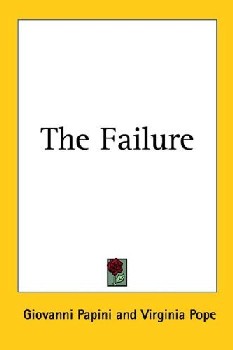
Paperback: 336 pages
ISBN: 141790836x |
Journalist, polemical critic, poet, and novelist, whose avant-garde polemics made him one of the most controversial Italian literary figures in the early and mid-20th century. The Failure is among his most popular works. It is an autobiographical novel that draws a portrait of a restless intellectual and his deep dissatisfaction with contemporary philosophical debate and intellectual mediocrity. |

Giovanni Papini, Four and Twenty Minds, translated from the Italian by Ernest Hatch Wilkins, Kessinger Publishing, New York 2005
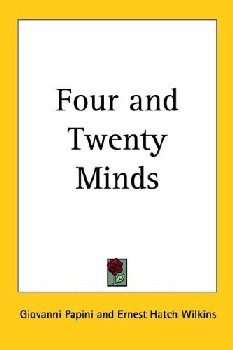
|
The essays contained in this volume were selected from Papini's 24 Cervelli (Four and Twenty Minds), his Stroncature (Slashings) and Testimonianze (Testimonies). They are surveys of men and Papini writes that some of the essays are tributes of affection, some are slashings; some reveal neglected greatness, others demolish undeserved reputations. Some of those profiled in this volume include: Dante, Leonardo da Vinci; Hegel, Walt Whitman, Hamlet, William Tell, Maeterlinck and others. |
|
Paperback: 336 pages
ISBN: 1417931140 |
|

Giovanni Papini, Life of Christ, translated from the Italian by Dorothy Canfield Fisher, Kessinger Publishing, New York 2005
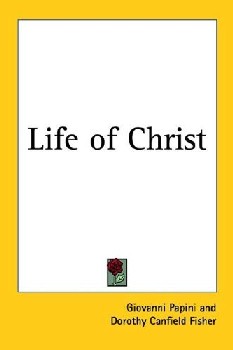
|
The confession of a man who after years of turbulence and atheism has turned to the simple faith of Christ. Giovanni Papini is the foremost man of letter in italy; he has been hailed as a master by Bergson, and was a friend and disciple of William James; he has written novels, poems, plays, essays, and has studied all the systems of philosophy. "He was," says Henry James Forman in the Pictorial Review, "a hater than a lover of his kind, a master of invective, anarchist, atheist, nichilist. And now he has written a book that is already translated or being translated into a dozen languages, a book that turns its back upon all criticism of analysis, that has for its one sim and goal the calling back of the human race to the religion of love." From the old, old story Papini cuts away the layers of embellishment and ceremony with wich literature, theological systems and skeptical critics have obscured the picture of Christ's life and times, and he writes with a simplicity that makes the story clear to every mind and with a burning passion that brings it home to every heart. |
|
Paperback: 424 pages
ISBN: 1417923806 |
|

Giovanni Papini, The Devil: Notes for a future Diabology, translated from the Italian by Adrienne Foulke, E. P. Dutton & Co., Inc., New York 1954 (Eyre & Spottiswoode, London, 1955)
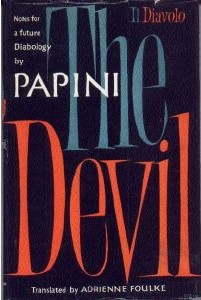
|
In this unusual and stimulating book, the author of the Life of Christ, The Letters of Pope Celestine VI to All Mankind, and other works of profound faith and learning, writes once again on a theme of vital spiritual significance: the role of the Devil in divine and human affairs, and the possibility of the Fallen Angel's eventual regeneration and redemption. A courageous, reverent an deeply moving work, The Devil reflects Mr. Papini's long interest in the religious and philosophical problems of Satan and his destiny. It reflects on every page, too, its author's wide ranging knowledge and his gift of philosophical inquiry and original, creative thought. But for all its brilliance and learning, The Devil is an eminently readable book, warmly and engagingly written in graceful, lively prose. Its moving quality arises primarily from Papini's deep and warmly inspiring faith, which he follows through, with penetrating insight, to its ultimate conclusions. |

Giovanni Papini, The Letters of Pope Celestine VI to all Mankind, translated from the Italian by Loretta Murnane, E. P. Dutton Co., Inc. Publishers, New York 1948
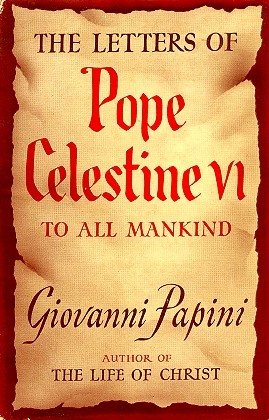
|
"...these Letters (...) can be to us illuminating, guiding, heartening, moving, affecting, and rekindling. They are not directed only to Christians, but to all men, of every conditions, of all nations, and, in particular, to those who ponder and suffer, to all those who long for salvation through a Christian super-humanity".
Giovanni Papini (from the Preface) |

Giovanni Papini, Dante Vivo, translated from the Italian by Eleanor Hammond Broadus and Anna Benedetti, The Macmilllan Company, New York 1935
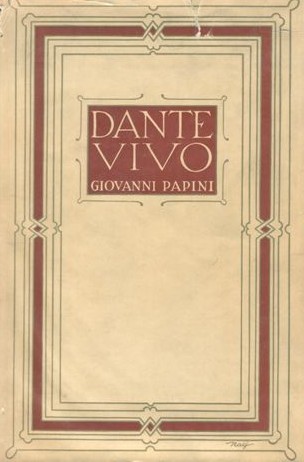
|
In the vast mass of literature on Dante, the general reader and the inexperienced student alike are lost. Here is a book for them - clear, interesting, free from pedantry. For the reader who knows his Dante, here is a fresh approach - a dispassionate examination of the poet's psychology based on all the known documents and on what Dante himself wrote. For the lover of biography here is a brilliant re-creation of the great Florentine in the setting of his times, amid the struggles of factions and the strife of Papacy and Empire. The author, Giovanni Papini, already known to English readers through his "Life of Christ", cuts his way through the forest of erudition and criticism which has grown up around Dante, and shows us Dante as he lived, Dante vivo. A distinguished Florentine of today presents the greatest Florentine of the past. |
|
Foreword to English Readers by Giovanni Papini
The first "spirito eterno" of poetry which came to dwell with me in the days of my youth was Prince Hamlet. The first philosopher who made a profound impression on my mind was Berkeley, and later I translated his works into Italian. The first poet who took possession of my youthful soul was Walt Whitman. The first foreign review to which I contributed was the Monist, published in Chicago. the first thinker of a nation other than my own to whom I was bound by ties of genuine friendship was William James.
There must exist, therefore, a kind of foreordained harmony between the Anglo-Saxon culture and my own mind, and perhaps it id due to this special arrangement of fate that my works have had more readers in Great Britain and North America than in Italy itself.
I am happy that, at the moment when my book on Dante is about to be issued in the language of Shakespeare, an opportunity has been given me to express to this great group of English readers my sincere and fervent gratitude. If these my non-Italian readers may be taken as representing by anticipation the judgement of the future, I take pride in having had an honourable and favourable reception by that immense posterity who live on the shores of all the oceans, and who have always known how to mix in due proportions the venerable traditions of humanism with the bold pursuit of every modernity, to carry side by side a proper conservatism and a necessary radicalism.
No writer can say that he has created and thought for all men until his work has been translated into English, that is, into the language which represent to-day the most universal vehicle of the printed word. What the Greek language was from the time of Alexander the Great to St Paul, what the Latin was during all the Middle Ages and until the final splendours of the Renaissance, that the English language is to-day.
And for me, a Florentine and an Italian, it is a great satisfaction to see – thanks to the labour of Eleanor Hammond Broadus and Anna Benedetti – this book on Dante translated into English. Outside of Italy no other country has so greatly loved and studied the creator of the Divina Commedia as have England and America. Not only have they produced accomplished Dante scholars – like the English Lord Vernon, H. C. Barlow, Edward Moore, Paget Toynbee; and the American Longfellow, C. E. Norton, J. R. Lowell – worthy to stand on an equality with the Italian and the German; but the first-hand knowledge of Dante’s work, even among those of moderate culture, is more widespread than elsewhere. the English-speaking peoples not only know Dante, but they admire him, appreciate him, understand him, love him.
The literature in English about Dante is extraordinarily rich and abundant. Therefore I count it a great honour that this book of mine should be published in Great Britain and in North America. Perhaps it merited this fortune because, as the reader will see, it is a little different form other books on Dante in that it tries to bring out new elements through an untrammelled and dispassionate investigation of the secret soul of the divine Poet. Fanatical adulators and pedants with extravagant imagination have almost buried Dante for a second time under a massive and majestic mausoleum of criticism, erudition, interpretation, and rhetoric.
This book is an attempt to resurrect him. I am confident that its true import will be understood by English and American readers.
Giovanni Papini
1 May, 1934
Florence, Italy |

Giovanni Papini, Four and Twenty Minds, Selected and translated from the Italian by Ernest Hatch Wilkins, Books for Libraries Press, Freeport, New York First published 1922, reprinted (Essay Index Reprint Series) 1970
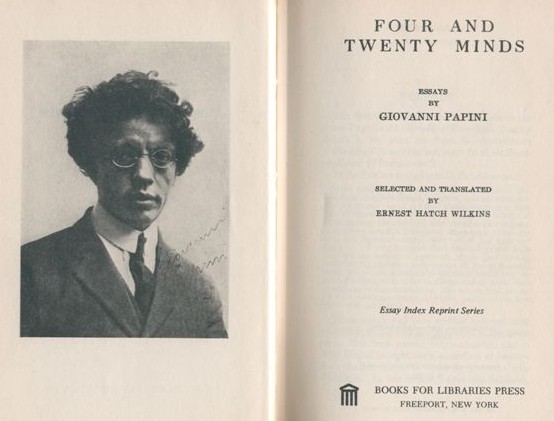
|
Contents:
The Unknown Man, Dante, Leonardo Da Vinci, Leon Battista Alberti, Berkeley, Spencer, F.C.S. Schiller, Hegel, Nietzsche, Walt Whitman, Croce, Armando Spadini, Hamlet, Remy de Gourmont, Ardengo Soffici, Swift, Carolina Invernizio, Alfredo Oriani, William Tell, Don Quixote, Kwang-Tse, Calderón, Maeterlinck, Giovanni Papini. |
|
"The first ten of the essays here translated are from Papini's 24 Cervelli ("Four and Twenty Minds"), the next six from his Stroncature ("Slashings"), and the last eight from his Testimonianze ("Testimonies"). In the Preface to 24 Cervelli, Papini writes: These essays deal with twenty-four men - poets, philosophers, imaginary beings, scientist, mystics, painters - grouped without regard to logical classification or to their relative importance. Some of the essays are tributes of affections, some are slashings; some reveal neglected greatness, others demolish undeserved reputations. Some are long, and represent careful study, others are brief and slight... I have surveyed these four and twenty souls not with the scrupulous exactitude of the pure scholar, nor with the definitive cocksureness of the professional critic, but as a man seeking to penetrate deeply into the lives of other men in order to discern and to reveal their lovableness or their hatefulness. The essays, then, are for the most part impassioned, subjective, partial - lyric, in a sense - and not critical. These essays had been written between 1902 an 1912: 24 Cervelli was published in the latter year. The book proved very successful; and in 1916 Papini brought out a second set of twenty-four similar essays, to which he gave the title Slashings. In this volume, as the title indicates, attack and demolition have a larger place, and the style is at times vituperative in the extreme. Many of the essays, nevertheless, are friendly and constructive. Papini’s caricature of himself (from Testimonies), which appears as the last essay in the present translation, was written soon after the publication of Slashings, and reflects the sensation made by that book. Testimonies, published in 1918, is a third set of twenty-four essays. They are of the same general character as those contained in Slashings, though the part of invective is somewhat less, and the tone of the book as a whole in quieter".
Ernest Hatch Wilkins (from the Preface) |

Giovanni Papini, Four and Twenty Minds, G. Harrap & C., London 1923
Giovanni Papini, Life of Christ, Harcourt, Brace and Company, New York 1923
Giovanni Papini, The Story of Christ, Hodder and Stoughton, London 1923
Giovanni Papini, The Failure, Harcourt, Brace and Company, New York 1924
Giovanni Papini, Life and Myself, Brentano's, New York 1930
Giovanni Papini, Labourers in the vineyard, translated from the Italian by Alice Curtayne, Sheed & Ward, London. First published 1930, reprinted (Kennikat Press) 1970
Giovanni Papini, Saint Augustine, Hodder and Stoughton, London 1930
Giovanni Papini, Saint Augustine, Harcourt, Brace and Company, New York 1930
Giovanni Papini, Gog, Harcourt, Brace and Company, New York 1931
Giovanni Papini, Dante Vivo, The Macmillan Company of Canada 1934
Giovanni Papini, A Man finished, Hodder and Stoughton, London 1936
Giovanni Papini, Michelangelo, his life and his era, translated from the Italian by Loretta Murnane, E. P. Dutton & Co., Inc., New York 1952






